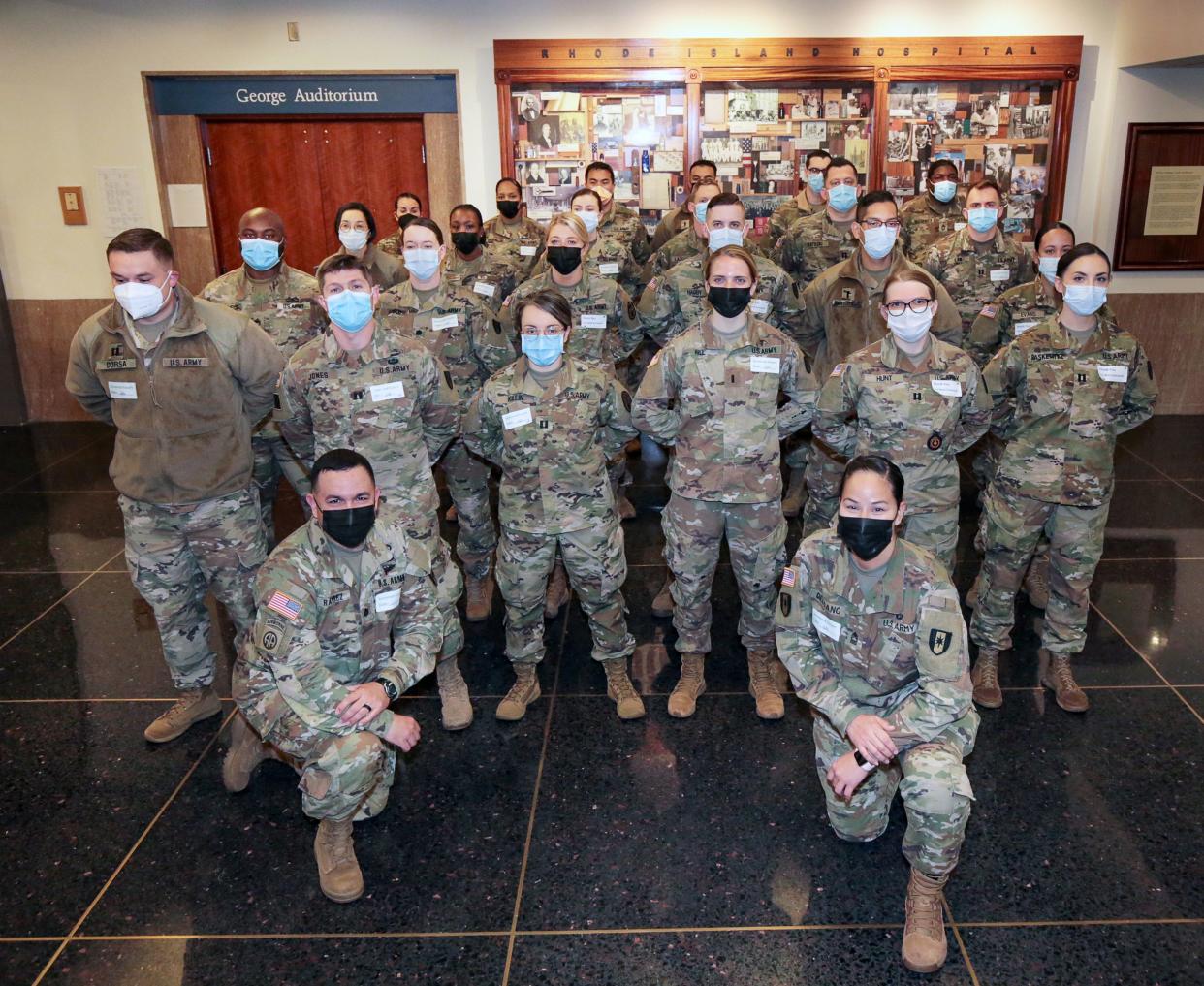Rhode Island Hospital receives team of military doctors, nurses, amid latest virus surge

PROVIDENCE — The rise of the omicron variant late last year, coming two years into Rhode Island’s battle with the pandemic and coinciding with a severe shortage in doctors and nurses, was a dire development for exhausted staff at Rhode Island hospitals.
In a letter to Gov. Dan McKee, the president of Rhode Island’s chapter of the American College of Emergency Physicians called the situation “terrifying,” saying that the shortages put some patients at risk of dying while waiting for care within 50 feet of a doctor.
“This is a true tragedy that currently is unfolding,” wrote Dr. Nadine T. Himelfarb.
On Friday, Himelfarb said she felt tinges of hope as she learned about the arrival of U.S. military personnel at Rhode Island Hospital.
A team of doctors, nurses, and other specialists — almost two dozen strong, mostly from the Army — was finally on the ground at the state’s largest hospital. The group, brought in by the Federal Emergency Management Agency, was to begin taking care of patients on Saturday.
More COVID-19:
With influence of COVID, Prudence Island is seeing signs of change
He hesitated getting the vaccine. Now he's in a life-or-death battle with COVID
Michael Fassel, Warwick father, airport worker, dies after battle with COVID
“We need personnel at every single level,” Himelfarb said.
The team includes three supervisors, three doctors, a physician assistant, 11 critical-care nurses, two emergency-room nurses, a surgical nurse and two respiratory technicians.
The reinforcements will bolster the hospital’s ability to provide intensive care to the sickest of patients, according to the hospital’s chief medical officer, Dr. Dean Roye.
Staffing shortages had reduced the hospital’s intensive-care capacity by 35 beds, Roye said, adding that he hopes the additional staffing will allow staff to bring four beds back into service.
With about 100 patients in intensive care, Roye said, the hospital had just one spare bed on Friday.
A total of 125 beds, he said, were out of service due to a lack of staffing.
About 260 patients either have COVID-19 or they remain in the hospital after clearing infection, Roye said.

During the omicron phase of the pandemic, the hospital has run into its worst staffing shortages since the outset of the pandemic in early 2020.
Earlier staffing issues frequently stemmed from the departure of staff who opted to work in other pandemic settings, often as contractors.
Those issues have continued to deplete staffing. In addition, the hospital grapples with absences due to staff who cannot work due to COVID and other illnesses.
The staffing has grown so thin that the team lacks the capacity to care for as many patients as it wants to.
“We have open requisitions to get more staff,” Roye said. “They’re just not out there.”
On Dec. 15, one day after Himelfarb wrote to McKee, McKee wrote to FEMA, calling for help with hospital staffing.
Conditions at Rhode Island Hospital during the onset of omicron brought some of the pandemic's darkest days for staff.
Prior to the arrival of the new variant, almost two years into the crisis, staff were already exhausted. The flu pandemic of 1918 had lasted about that long, Roye said.
"Everybody had hoped that with delta starting to wane ... we were going to hopefully be past the pandemic," he said.
It was "demoralizing" to anticipate the pandemic's fourth surge in Rhode Island, said Roye. "... omicron took over and the numbers just kept going up exponentially. It was a really difficult time. I think morale was probably at an all-time low."
Difficult weeks went by.
Then, on Jan. 13, President Joe Biden announced that military medical personnel would deploy to six states, including Rhode Island.
Roye didn't get his hopes up.
“It would almost be worse if you though you were going to get them and you didn’t get them," he said.
The reinforcements are here for 30 days with the potential for an extension.
COVID by the numbers
Cases in R.I.: 327,109 (2,875 reported Friday)
Negative tests in R.I.: 6,731,428 (16,467 reported Friday; 14.9% positive rate)
R.I. COVID-related deaths: 3,240 (16 reported Friday)
Rhode Islanders hospitalized with COVID: 505 (45 in intensive care)
Fully vaccinated in R.I.: 797,889 (918,914 at least partially vaccinated)
Cases in Mass.: 1,519,783
Mass. COVID-related deaths: 21,295
Cases in U.S.: 69,591,919
U.S. COVID-related deaths: 861,392
This article originally appeared on The Providence Journal: Military doctors, nurses, technicians arrive at Rhode Island Hospital

